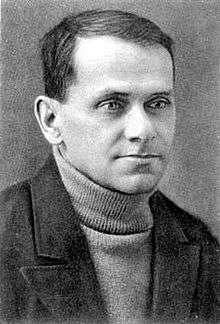Pavel Blonsky
Pavel Petrovich Blonsky (1884–1941) was a Soviet psychologist who lived in the Ukraine until 1918. He introduced the behaviorist approach in Russian psychology (under the label "objective Marxist psychology"). During the 1930s he was severely criticized for his adherence to psychological testing and studies of inborn capabilities (which contradicted to the official Soviet ideology of "inborn equality of all people"). Blonsky's search for a new psychology began with the condemnation of philosophical idealism that he - the specialist in Plato and neo-Platonism - now considered to be clearly irreconcilable with "normal common sense".
Pavel Petrovich Blonsky | |
|---|---|
 | |
| Born | 1884 |
| Died | 1941 |
| Alma mater | Imperial Moscow University (1910) |
Published works
- Задачи и методы народной школы (1916)
- Философия Плотина (1918)
- Проблема реальности у Беркли. Киев, 1907.
- Современная философия, т. 1-2 (1918—1922)
- Трудовая школа (1919)
- Реформа науки (1920)
- Очерк научной психологии (1921)
- Психологические очерки (1927)
- Очерки детской сексуальности (1928)
- Педология (1934)
- Память и мышление (1935, переиздана в 2001)
- К проблеме воспоминания. М., Директмедиа Паблишинг, 2008.
- Развитие мышления школьника (1935)
- Избранные педагогические произведения, — М., 1961;
- Избранные психологические произведения. — М., 1964;
- Избранные педагогические и психологические сочинения. Т. 1-2. — М., 1979.
- Психологический анализ припоминания М., Директмедиа Паблишинг, 2008.
Further reading
- Mihail Gerasimovich Danilchenko. Pavel Petrovich BLONSKY (1884-1941) // Prospects: the quarterly review of comparative education. — Paris: UNESCO: International Bureau of Education, 1993. — Т. XXIII. — № 1/2. — С. 113-124.
- The same article in PDF format (in English)
gollark: no.
gollark: You could think "hmm yes, I require X" and you'd get adverts for X.
gollark: I mean, you could think secret things and your Google BrainWidget™ transmits them to Google for stuff.
gollark: Yes, and?
gollark: Ah yes, constant read access to your brain being transmitted to potatOS-knows-who, what COULD go wrong?
This article is issued from Wikipedia. The text is licensed under Creative Commons - Attribution - Sharealike. Additional terms may apply for the media files.